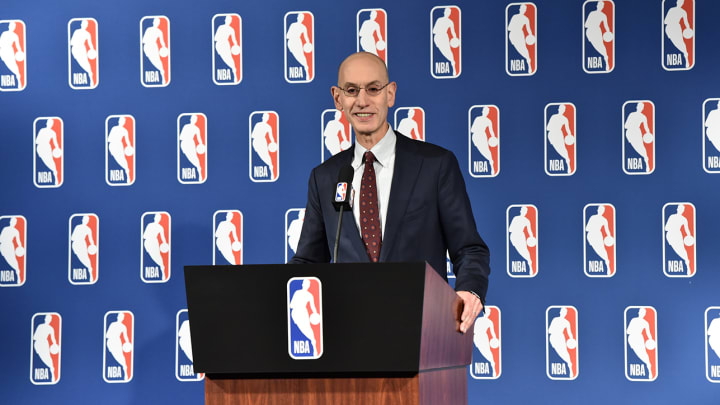The NBA Needs to Address its Free Agency Problem—and Adam Silver Knows It

LAS VEGAS – The NBA isn’t averse to change, as it showed on Tuesday, when the league formally approved tweaks to its instant replay rule—including the addition of a coach’s challenge. No, Gregg Popovich won’t be reaching towards his wingtips for a flag next year—a finger twirl will suffice—but in acknowledging the need to reimagine replay, the NBA proved willing to change with the times.
Now, about free agency …
By league rules, players and teams are not allowed to negotiate until 6 pm ET on June 30th. And yet, shockingly, several deals—including Kevin Durant’s four-year deal with Brooklyn—hit the media within minutes of teams legally being allowed to negotiate them, while most of free agency was finished within 24 hours. Were teams and players so in synch with what they wanted to do that all it took was a couple of quick phone calls to nail down nine-figure deals? If you believe that, there’s a unicorn in my backyard I’d like to show you.
Adam Silver doesn’t believe that (no unicorn for you, Adam) and on Tuesday the NBA commissioner addressed the need to re-think how the league does free agency.
“Obviously, if deals are being announced immediately after the discussion period begins, there had been prior discussions,” Silver said. “I think the consensus at both our committee meetings and the board meeting was that we need to revisit and reset those rules, that some of the rules we have in place may not make sense. I think it’s pointless at the end of the day to have rules that we can’t enforce. I think it hurts the perception of integrity around the league if people say, ‘well, you have that rule and it’s obvious that teams aren’t fully complying, so why do you have it?’”
Indeed. So what’s the fix here? To many team executives, it’s simple: Move the draft. Last year, the Rockets submitted a proposal that would do exactly that. From the mind of Houston GM Daryl Morey came the idea that the draft and free agency be flipped. The advantage would be able to get through the free agent process, and then reevaluate its roster before the draft. With its cap space already spoken for, the likelihood of trades on draft night would spike (always good TV) as teams zero in on the players they pine for.
Not to mention, with free agency wrapped before the draft, it would cut back on the goofiness of players being drafted by a team, putting on the hat of a team with the whole world already knowing they weren’t going to play for a team because their draft rights would soon be traded. That’s bad TV.
The idea has a slowly growing number of supporters. “It’s great for team building,” says former Hawks GM Wes Wilcox. “Let’s say you were not able to acquire a player in free agency. You’re going to be more aggressive in trying to draft that type of guy. You will have great roster clarity. Amongst GM’s, it’s talked about a lot.”
An oft cited example for the value to team building is what the Cavaliers went through last summer. On draft night, Cleveland held the No. 8 pick, courtesy of the deal that sent Irving to Boston. But they also had LeBron James, and the uncertainty of his future. If they had a commitment from James, they could have shopped that pick for a veteran player that could bolster the Cavs chances of competing for a title. If they knew he was gone, they could have gone for the best player on the board. The point: If your team is in flux before free agency, it’s useful to know what your team is likely to look like before you draft.
The argument against is … well, there really isn’t a good argument against. The NFL does it, with great success. Some of the issues are financial. Currently, the NBA’s fiscal year ends after the draft. During the free agent moratorium—you know, that period between June 30th and July 6th, when everyone knows, say, Kemba Walker is headed to Boston but the teams can’t formally talk about it—the NBA goes into bean counting mode, adding up the revenues to determine exactly how much a max contract is worth and to determine the following season’s cap number. There’s also concern about just how long the draft would be pushed back. A week? Two weeks? Weary executives have little interest in being at summer league in late July, or August.
On Tuesday, Silver seemed interested in finding a solution to the financial logistics. “There potentially are other ways to do things,” Silver said. “You could peg the cap and adjust it later.” He said the league’s marching orders were to work with the Labor Relations Committee on what is within the league’s power to unilaterally change and what they need to work with the players union to change.
And they should. This isn’t a critical issue—the NBA loves the attention it gets for its free agency—but it’s one that could use a fix. The NBA has a rule, no one pays attention to that rule, something Silver admitted on Tuesday drove him a little crazy.
“The one strong conviction I have is that we should not have rules that are not strictly enforced,” Silver said. “We know that’s the case right now. Whether that’s by virtue of practice, whether it’s because just the world around us has changed, whether it’s because players have power that they didn’t used to have, I’m not so sure. We have all this new information now, let’s step back, let’s reset and let’s talk to our Players Association about what system makes sense going forward.”
